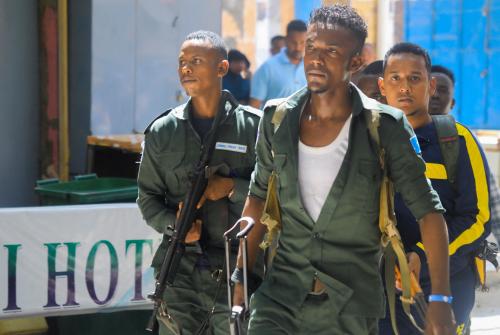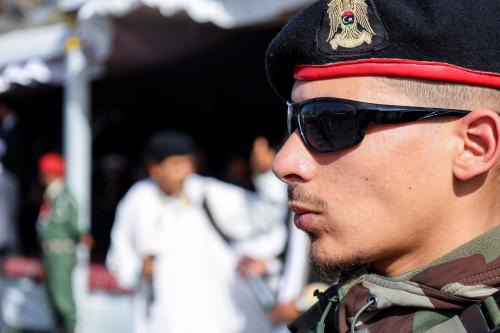It has become fashionable to say that the fight against Al Qaeda is again going badly. Despite gains made in removing terrorist chieftains in Pakistan, Syria has become a magnet for jihadists, and that failing state will bedevil the West for years to come. Repression of the Muslim Brotherhood in Egypt is also recreating — and even turbo-charging — the kind of conditions that produced an earlier generation of extremist killers.
I don’t disagree. Syria is en route to being the new problem from hell: a land of atrocities and terrorists, which is attracting more militants from around the Muslim world than Iraq and Afghanistan did together. When an Egyptian court convicts 529 supporters of ousted Muslim Brotherhood President Mohammed Morsi to death in one murder case, it is hard to be optimistic about the long-term tranquility of millions of Brotherhood members and followers.
Transfixing though those messes may be, it is also important to recognize the success stories — even if they are incomplete — because we need an accurate overall threat picture and we need to learn what works. Yemen, as demonstrated by the counterterrorism strikes that killed more than 50 militants earlier in the week, is a little-reported success story.
In 2009, cooperation between Washington and Sana’a was at a low point because a senior US official had crowed about a targeted killing that the regime of Yemeni President Ali Abdullah Saleh wanted to go unremarked. In the years that followed, the Yemeni-based Al Qaeda in the Arabian Peninsula grew to be a major concern. It became the first Al Qaeda franchise — as distinct from the core group in Afghanistan/Pakistan — to threaten the United States at home.
So much became clear in December of 2009, when an ambitious plot was launched to destroy the US embassy in Sana’a and Nigerian Umar Farouk Abdulmutallab tried to detonate a bomb sewn into his underwear by AQAP on a Northwest Airlines flight to Detroit. President Saleh resumed working with the United States. A world-class schemer, he limited cooperation to try to extract greater support for his pet projects from Washington. Once the country was enveloped by Arab Spring demonstrations – and Saleh was sidelined by a nearly fatal bomb blast – AQAP took advantage of the disarray to take hold of large swaths of territory throughout Yemen.
As Saleh drew back from politics, the United States pressed for deeper engagement to train and equip Yemeni counterterrorism forces. It was pleasantly surprised to find in Vice President Abd Rabbuh Mansur Hadi, who replaced Saleh, a man dedicated to wiping out the terrorists who threatened his county.
AQAP’s territorial gains were rolled back, and the cooperation between the United States and Yemen has deepened. The recent strikes show that joint effort is paying off. According to press reports, the action included a combination of US air power and Yemeni field operations. Yemen is a country where much territory is ungoverned, and the Yemeni piece of this involved a deployment into the dangerous Shabwa Governate.
That already represents progress over what was possible in the very recent past. Yemen is a country where military appointments are often made on the basis of tribal and clan connections, so training is challenging. If these joint operations are found to have taken off the battlefield either AQAP leader Naser al-Wuhayshi or the master bomb maker, Ibrahim al-Asiri, who reportedly created the underwear bomb and even more diabolical devices, this will have been a big leap forward.
It will also be a testament to the virtue of sticking with the program, however difficult. American engagement in Yemen began more than four years ago, and it will take many years until the country can comprehensively deal with the threats inside its borders. The United States has not always demonstrated strategic patience in areas where this kind of capacity-building is required. But there is no other way to help our partners get where they want to go. Ultimately, it must be our goal to have others deal with the dangers in their neighborhood, because if large-scale US intervention is required, we risk large-scale blowback.
Another key lesson is that the US must demonstrate to its partners that it cares about more than its own security. Yemen is a country with endless woes. It has the largest and fastest-growing population on the Arabian Peninsula, the poorest citizenry in the Arab world, a water table near exhaustion, and a dying hydrocarbon industry that brings in scant profits.
Since President Hadi took power, the United States has spent $250 million on humanitarian efforts, $100 million on economic development, and $40 million in support of the ambitious political transition that he is leading. That total is more than the US has spent on support for Yemeni counterterrorism efforts, and one crucial reason why the Yemenis are also sticking with a program that benefits everyone — except the terrorists.
This piece was originally posted in
The Boston Globe
.



Commentary
Op-edTerror Takes A Hit In Yemen
April 27, 2014